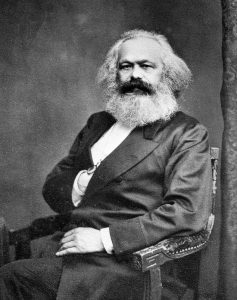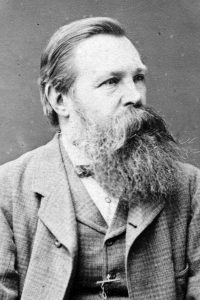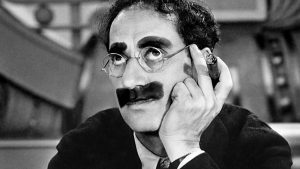
(publishen in El Cultural, culture supplement of El Mundo newspaper)
This past 5th May was the 200th anniversary of the birth of Karl Marx. It is difficult to exaggerate the influence that his economic, political and philosophical doctrines have had on the last century and a half of human history.
His sympathies for mathematics, in particular infinitesimal calculus, are, however, little known.
There is written evidence (in letters to Friedrich Engels (1820-1895)) that by 1858, Marx began to take an interest in mathematics as a tool for developing the economic foundations of what would later become one of his most influential works Das Kapital; Marx always thought it would be possible to determine mathematically the laws underlying financial crises. This was the beginning of a flirtation that ended in a love affair with infinitesimal calculus. In his correspondence with Engels we find evidence of this interest. Thus, in 1860 he wrote to him: “The only activity that gives me the necessary peace of mind is mathematics”; and three years later: “In my spare time I do differential and integral calculus. By the way, I have a lot of books on the subject and I can send you one if you care to try it out. I think it is very necessary for your military studies”.

Infinitesimal calculus is a scientific and technological tool of the first level, undoubtedly the most powerful and effective tool for the study of nature ever developed by mathematicians. Calculus was born in the last third of the seventeenth century, and it had two great midwives: Isaac Newton and Gottfried Leibniz (which ended up generating between them a very hard, rough and dirty fight to determine who was the first inventor). But infinitesimal calculus (in both Newton’s and Leibniz’s versions) originally had a serious problem: the enormous weakness of its logical foundation, since it was based on infinitesimals and infinitely large quantities. These mathematical objects, related to infinity, were not properly defined; moreover, they satisfied very peculiar and more than debatable properties that were handled purely intuitively (for example, an infinitely large number A verified the disturbing equality A+1=A). Although they were aware of this logical weakness (denounced in a brilliant way by Bishop George Berkeley in 1734), such was the momentum that infinitesimal calculus gave to mathematics and physics that few scientists renounced its use. Modern physics was born with Newton, and it is no coincidence that Newton is also one of the inventors of the infinitesimal calculus. In fact, infinitesimal calculus was the ally that allowed Newton to culminate in his masterpiece, the Principia, the astronomical revolution that Copernicus had begun a century and a half earlier, and which allowed us to understand how and why the planets move around the Sun. Leibniz and his disciples also used calculus to solve many and diverse mechanical problems that until then had proved intractable, even for geniuses of the stature of Leonardo da Vinci and Galileo.
In 1863, when Marx began his love affair with infinitesimal calculus, it already had an acceptable logical foundation, thanks to the papers that Augustin Cauchy had prepared for the École Polytechnique in the 1820s and the arithmetisation carried out by Karl Weierstrass from the mid-nineteenth century at the University of Berlin. Marx, who was not aware of these developments (probably not even of Cauchy’s contributions), showed great interest in the foundations of calculus, and even wrote some papers on the concepts of the derivative and the differential. Marx considered it very relevant that such an essential part of mathematics had been developed with such a lack of logical foundation, because in that way, also dialectical materialism (the force that shapes the material and contradictory totality that forms the universe) could be applied to the apparently perfect and logical world of mathematics. An echo of this can be found in some of Engels’ writings: “With the introduction of variable magnitudes and the extension of their variability to the infinitely small and the infinitely large, mathematics, so authentically moral in other respects, fell into disgrace. They ate from the tree of good and evil, which led to a path of colossal discoveries but, at the same time, of errors. The virginal state of absolute validity and irrefutable certainty of mathematics ended forever. Mathematics entered the realm of controversy, and we have reached the point where the majority do differentials and integrals not because they understand what they are doing, but from pure faith, and because they have hitherto always given correct results” (AntiDüring, 1878). In 1878, after the reforms of Cauchy and Weierstras, there was little truth in these statements of Engels, however relevant they were to the infinitesimal calculus of the 18th century (much of which, however, has been rewritten on sound logical grounds using the non-standard analysis of Abraham Robinson (1966)).
In the dialectical development of infinitesimal calculus, Marx considered three periods, the mystical differential calculus of Leibniz and Newton, the rational differential calculus of D’Alembert and the purely algebraic differential calculus of Lagrange. Of the mathematicians of the first period he said: “They themselves believed in the mysterious character of the newly discovered calculus, which produced certain results by a positively false mathematical procedure”. However, he was more condescending towards D’Alembert and Lagrange: “D’Alembert, by stripping the differential calculus of its mystical garb, has taken an enormous step forward. Lagrange took as his starting point Taylor’s theorem, which is the most general and extensive, and at the same time an operational formula of the differential calculus”.

Lagrange’s principles for the foundations of calculus, which Marx liked so much, were nevertheless wrong, as Cauchy showed in his writings. If Marx had known Cauchy’s book, he might have anticipated another Marx, Groucho in this case, when he said: “Those are my principles, and if you don’t like them… well I have others.”.
References
H.C. Kennedy, Karl Marx and the foundations of differential calculus, Historia Mathematica, 4 (1977), 303-318.
Antonio J. Durán, Crónicas Matemáticas, Crítica, Barcelona, 2018.

Leave a Reply